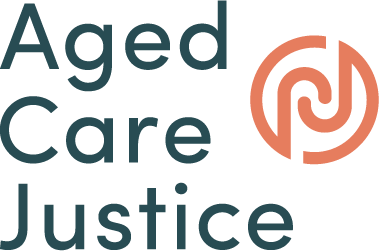Aged care providers to be granted civil and criminal immunity in relation to restrictive practices
ALARM met with the new Government on Friday 22 July to strongly recommend the rejection of Schedule 9, Section 54-11 of the Aged Care and Other Legislation Amendment (Royal Commission Response No. 2) Bill 2021 (“A.C. Bill No 2”). The proposed legislation includes section 54-11, which, if enacted, will provide an aged care provider with ‘immunity from civil or criminal liability in relation to the use of a restrictive practice in certain circumstances.’
A restrictive practice is any action that restricts a resident’s rights or freedom of movement, e.g.: chemical, environmental, physical and mechanical restraint or seclusion. The prescribing of psychotropic or mind-altering medication to influence a resident’s behavior is an example of a restrictive practice known as chemical restraint. Confining a resident to their room or a chair are other examples of restrictive practices known as environmental and physical restraint respectively.
The proposed immunity would be made available when informed consent is provided by the resident’s substitute decision maker and the provider has applied the restrictive practice pursuant to aged care subordinate legislation known as the Quality of Care Principles 2014 (Quality Principles).
The term “substitute decision maker” is not defined. Proposed subsection 54-10(1A) places no boundaries on the persons or bodies who may be authorised to give informed consent. It is understood the intention is to establish a hierarchy of people who would be authorised to provide such consent. However, it is unclear what kinds of people are to be included. This raises questions as to whether they would be appropriately skilled, informed, independent and able to act in the best interests of the care recipient. Such matters are left to the broad discretion of the responsible Minister.
The Quality Principles define each type of restrictive practice and specify the provider’s obligations when applying them. The key obligations include ensuring that restrictive practices are only applied as a last resort following appropriate clinical assessment, and obtaining informed consent for the practice from the resident or their substitute decision maker. If it is shown that the provider has met these obligations, then the immunity would apply.
Dr Bryan Keon-Cohen AM KC, President of ALARM said: “If enacted this legislation may well result in an increase in abuses uncovered by the Aged Care Royal Commission. For example, aged-care residents classified as “difficult” could be restrained without their families knowing. This legislation should not proceed without clear guidance on the types of persons who can act as substitute decision makers following proper public debate.”
ALARM supports the submissions of the Law Council of Australia and the Queensland Law Society that the Bill should not proceed in its current form or until the proposed scheme is properly regulated and monitored to protect the rights and interests of aged care residents.
“Removing an individual’s fundamental right of legal redress on the basis that an aged care provider has ostensibly complied with the Quality of Care Principles is an egregious abuse of basic human rights,” warns Dr Keon-Cohen. “The Royal Commission was called to investigate, among other things, how measures like industry standards have already consistently failed to guarantee adequate care. Further, the Principles can be varied by the responsible Minister without any requirement to ensure that the class of persons capable of providing vicarious consent is consistent with, or supportive of, the rights of aged care residents,” explains Dr Keon-Cohen.
The grant of immunity to aged care facilities from prosecution or claims, many of which are commercial businesses, is not authorised by any international covenant to which Australia is a party. Conversely, Australia has ratified the International Covenant on Civil and Political Rights [ICCPR], and its Optional Protocol, which allows for complaints regarding Covenant breaches to be made to the UN Human Rights Committee, once domestic litigation avenues have been exhausted. ALARM firmly believe Australian aged care residents are being denied their ‘right to liberty’ per Article 9 of the Covenant through this proposed Commonwealth legislation. To prevent those who are subject to unlawful restrictive practices from exercising their legal rights against those who implement such practices, contravenes Article 9 and denies the remedy of a Writ of Habeas Corpus, which supports the right to be free.
“The Bill is supposed to be a reform measure addressing the most pressing issues in aged care while we wait for the proposed new Aged Care Act. However, the offensive Schedule 9 has been rushed, is controversial, and it does not advance the urgent needs of aged care residents,” states Dr Keon-Cohen. “Instead, it limits the rights of residents experiencing potential unlawful imprisonment resulting from a restricted practice. The time to debate this measure in full and appropriately is during consideration of the new Aged Care Act. This would allow for rigorous examination of varying State and Territory laws defining substitute decision makers, expose Schedule 9 to public debate and due consideration from various industry bodies.”
ALARM’s primary function is to provide access to legal services for aged care resident victims, so that the unacceptable cycle of neglect, abuse and substandard care can be both scrutinised and abusers held accountable, if necessary in a court of law. However, without adequate reform this cycle will continue.
